Key takeaways:
- Media ethics are essential for maintaining public trust and shaping informed citizenry, influencing the perception of truth and reality.
- Accountability in journalism is crucial; ethical standards help combat misinformation and promote responsible reporting.
- The rise of technology, particularly AI, necessitates a focus on integrity in media practices and the importance of media literacy among younger audiences.
- Collaboration among media organizations can enhance ethical standards and rebuild public confidence in journalism.
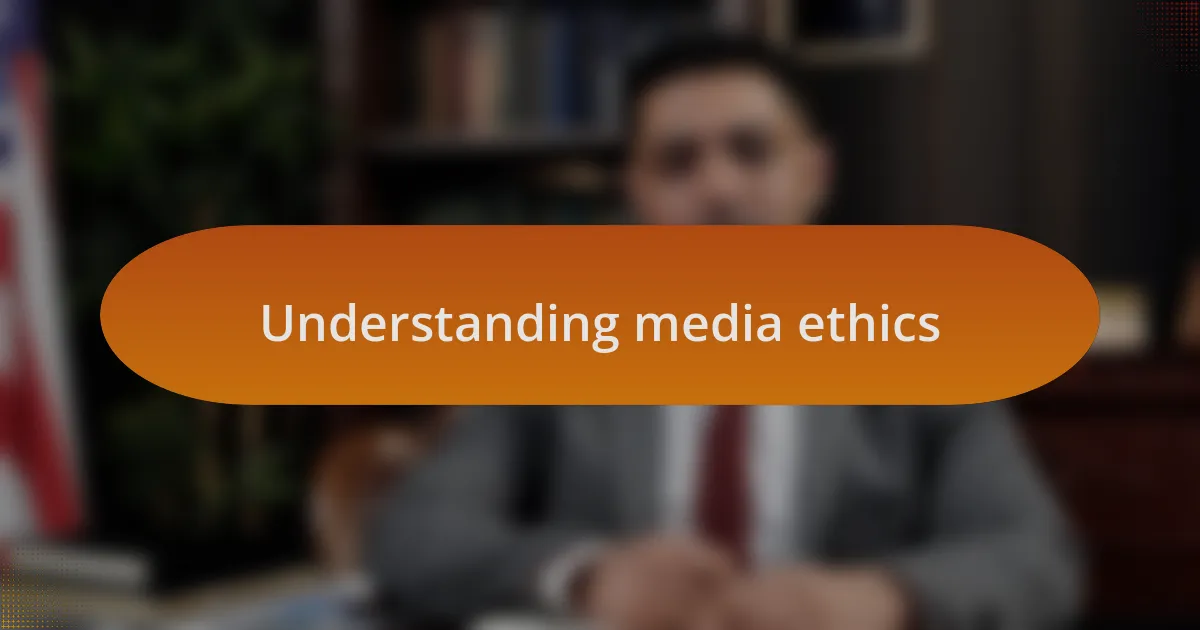
Understanding media ethics
Understanding media ethics isn’t just a theoretical idea; it’s a compass guiding how we interact with the news and information that fills our daily lives. I remember the first time I realized the weight of this responsibility. I came across a sensational headline that exaggerated a political issue, and it struck me: how can we trust what we read if the narrative is skewed to provoke emotional responses rather than inform?
The challenge lies in the balance between free expression and responsible reporting. Have you ever considered how our choices can shape public opinion? For instance, I once witnessed how a local story, instead of being reported neutrally, was framed to fit a particular agenda. This made me acutely aware of the power that journalists wield; it’s a reminder that their ethical considerations directly impact the public’s understanding of crucial issues.
When we think about media ethics, it’s essential to address the question of accountability. Who watches the watchmen? During my own journey, I’ve learned that having robust ethical standards isn’t merely a guideline; it promotes trust. After all, in a landscape rife with fake news and misinformation, which side would you rather stand on—truth or sensationalism?
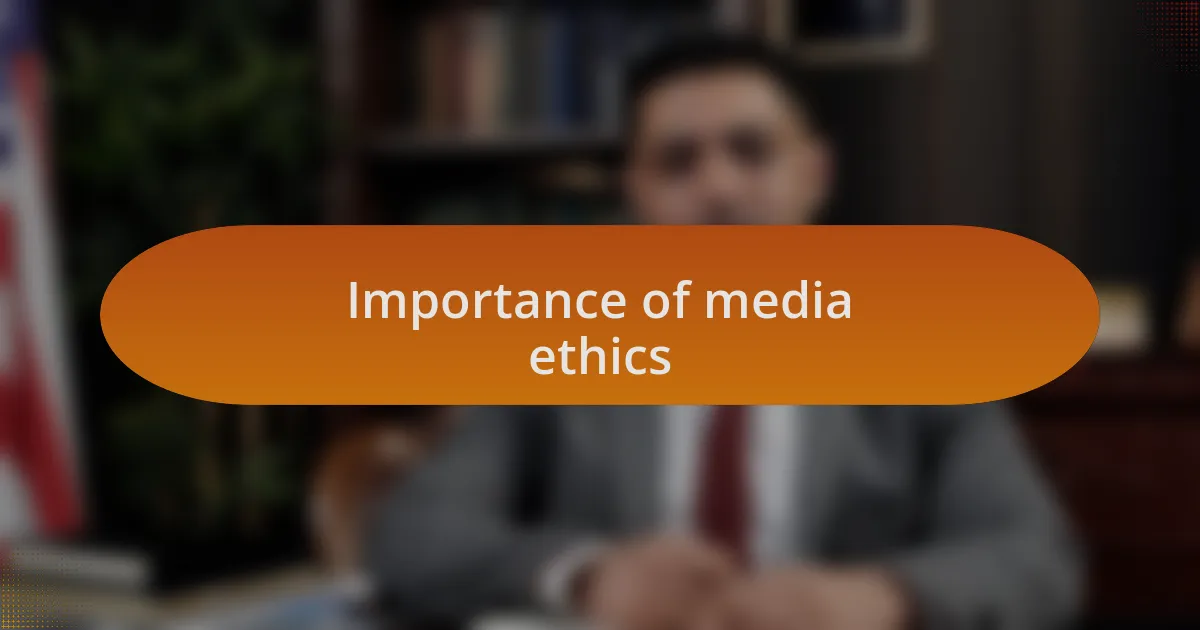
Importance of media ethics
The importance of media ethics transcends mere guideline adherence; it shapes how we perceive truth and understand reality. I recall a time when a high-profile political scandal broke. The media frenzy surrounding it was hard to ignore, yet I felt a tug of doubt with each report. Was the information being presented accurately, or were journalists chasing headlines at the expense of integrity? This realization deepened my understanding of how crucial ethical reporting is to maintaining public trust.
Moreover, media ethics play a pivotal role in fostering informed citizenry. Consider how the framing of issues can affect public discourse. In my experience, I’ve seen how a news report that lacks context can mislead audiences, steering conversations away from critical facts. It’s a sobering thought—if we, as consumers, don’t demand ethical standards from our news sources, we risk drowning in a sea of misinformation that can distort our worldview.
At its core, media ethics anchor the journalistic mission to enlighten rather than mislead. I often ask myself, what if each report prioritized integrity over sensationalism? From what I’ve observed, those who hold themselves to ethical standards not only build credibility but also empower their audiences to engage meaningfully with the themes shaping our society. This, in turn, nurtures a fabric of informed dialogue essential for democracy to thrive.

Role of media in politics
The media wields significant power in shaping political landscapes, influencing not just what we believe but how we act. I remember a time during an election cycle when a single headline triggered a wave of public sentiment. It made me wonder, how often do these moments hinge on the way a story is framed or presented? The impact is often immediate, but the long-term effects on public perception can reshape entire political narratives.
In my observation, the role of media extends to acting as a watchdog, ensuring that politicians are held accountable. Participating in a local town hall meeting, I witnessed firsthand how a tough question posed by a journalist changed the tone of a politician’s speech. It reinforced my belief that the right questions can lead to transparency and force leaders to address critical issues. But what happens when media outlets shy away from difficult topics? Are we left with a diluted version of accountability?
Moreover, media functions as a platform for citizen engagement, providing a space where voices can be amplified. I’ve engaged in discussions online where shared articles sparked debates that opened my eyes to diverse perspectives. It made me reflect on the essential question: Is our discourse enriched by these exchanges, or does it simply reflect our biases? My experience suggests that when media encourages dialogue rather than division, it can play a transformative role in our political interactions.
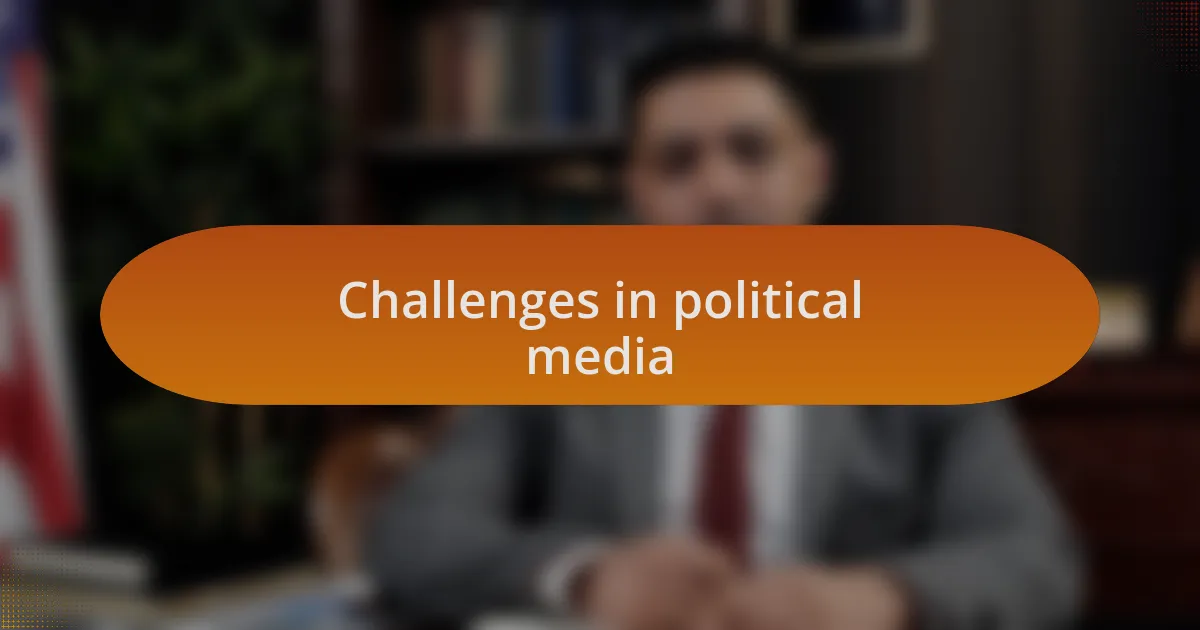
Challenges in political media
Navigating the landscape of political media often feels like walking a tightrope. One of the biggest challenges I’ve faced is the sheer volume of misinformation that can spread like wildfire. I recall a particular instance during a local election when a viral post misrepresented a candidate’s stance on a key issue. It was disheartening to see how quickly people rallied around a false narrative, illustrating just how critical it is for media outlets to maintain accuracy and credibility.
The issue of bias in reporting is another substantial hurdle in political media. I find it fascinating how certain news outlets may intentionally frame stories to align with specific political agendas. During a heated debate I attended, it was clear that the coverage favored one side over the other, which left me wondering: Can we truly trust the media to provide balanced views? That experience ignited a passion within me for advocating for objectivity and fairness in political reporting.
Lastly, the challenge of audience engagement looms large in this digital age. I often reflect on how social media algorithms prioritize sensationalism over substance, sometimes sidelining well-researched articles. There have been moments when I’ve shared extensive analyses only to watch them get overshadowed by clickbait headlines. This dynamic raises an important question: How can we foster an environment where thoughtful discourse prevails over viral sensationalism? My hope is that through conscious effort, we can encourage deeper conversations that truly matter.
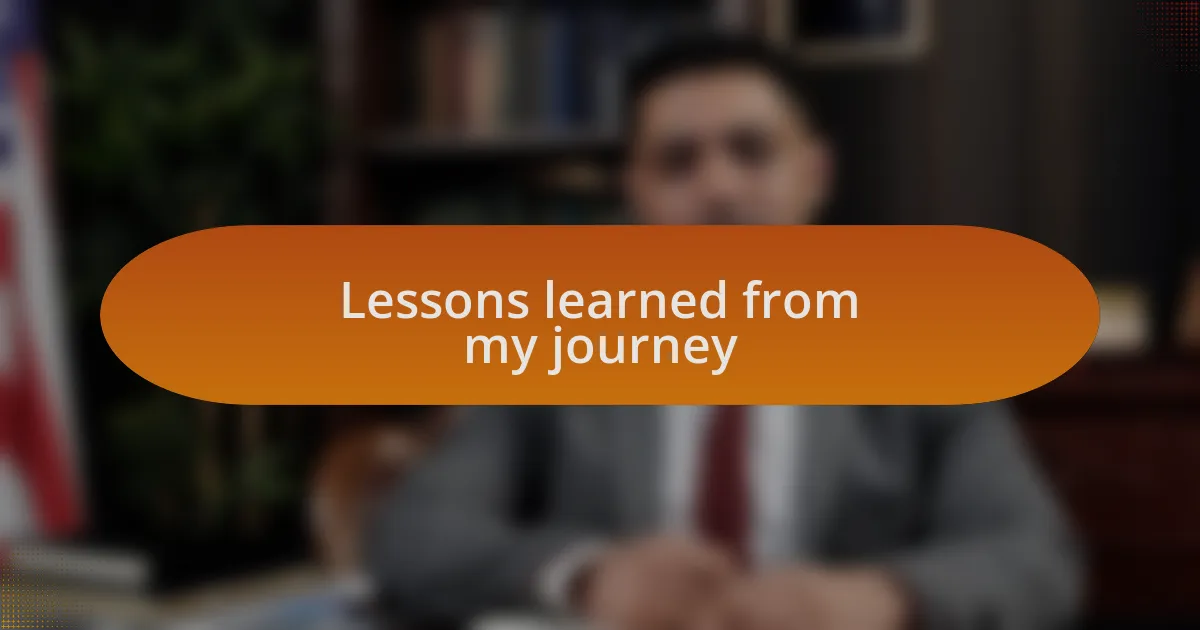
Lessons learned from my journey
Throughout my journey, one lesson that resonated with me is the importance of critically evaluating sources. I vividly remember a time when I shared an article that turned out to be riddled with inaccuracies. The backlash I received was a real eye-opener. It reminded me that just because something is widely circulated doesn’t mean it’s truthful. Now, I approach every piece of information with a more discerning eye, asking myself, “Is this truly credible?”
Another significant insight has been the power of empathy in media. During a workshop on responsible journalism, I learned to look beyond statistics and reports to understand the human stories behind them. This shift in perspective awakened my awareness of the impact our words can have. Have you ever considered how a single headline can change a person’s life? It genuinely made me reconsider how I communicate about political issues, striving to amplify voices that are often marginalized.
I also came to appreciate the necessity of transparency in reporting. There was an occasion when a fellow journalist revealed their process while covering a contentious topic, and it sparked a meaningful conversation about accountability. It hit me then that as media professionals, we need to show our work. How can we expect our audience to trust us if we don’t share our rationale? This realization has been instrumental in shaping how I engage with the public, encouraging openness as an essential step toward rebuilding trust in political media.
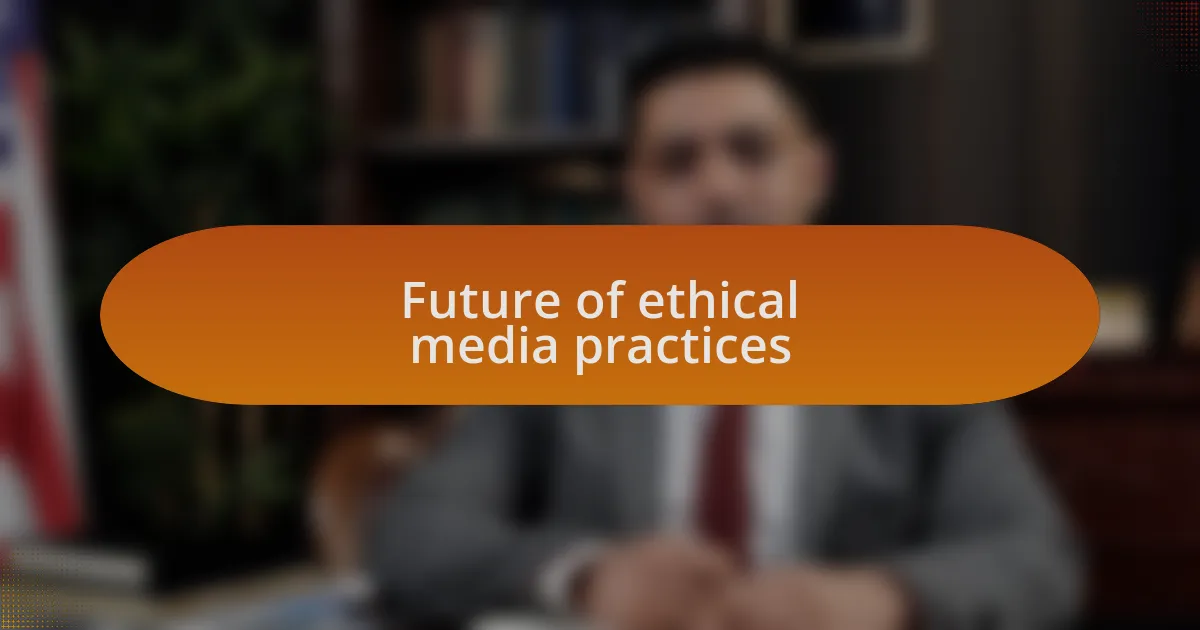
Future of ethical media practices
As I contemplate the future of ethical media practices, I can’t help but think of the responsibility that comes with technological advancements. With the rise of artificial intelligence in journalism, I wonder how we can ensure these tools foster integrity rather than misinformation. My experience with automated news generation taught me that while efficiency is important, the essence of storytelling—nuance, empathy, and context—must not be sacrificed.
Looking ahead, I envision a stronger emphasis on media literacy, particularly among younger audiences. I recall a workshop I led where students engaged in identifying biases in their news sources. The excitement on their faces when they found hidden agendas was telling. It made me realize that if we equip the next generation with critical thinking skills, we can foster a more discerning public that demands accountability and transparency from media producers.
Moreover, I believe collaboration among media organizations can pave the way for ethical standards. When I watched a panel discussion featuring rival news outlets coming together to address challenges in covering political issues, it struck me that unity can enhance the credibility of journalism as a whole. How can we break down silos in a fragmented media landscape? By sharing best practices and holding each other accountable, we can create an ecosystem that prioritizes ethical practices and restores public confidence.